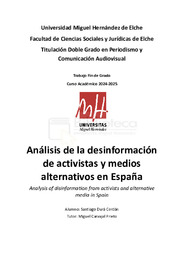Resumen :
Este Trabajo de Fin de Grado (TFG) analiza el impacto de la desinformación en España,
un fenómeno que trasciende el campo mediático y que genera desconfianza social
hacia los medios de comunicación y que, además, contribuye a construir un escenario
político, mediático y social cada vez más polarizado. Este estudio pretende enriquecer
las investigaciones específicas en este aspecto, especialmente por los medios
alternativos, y en el contexto español; por lo que ofrece un análisis crítico del entorno
comunicativo actual, sobre el cual se sustenta nuestro sistema democrático. Para ello,
segmenta en cuatro categorías las publicaciones de quince medios tradicionales,
digitales y agentes sociales elegidos intencionalmente por propagar información falsa o
engañosa, según su nivel de desinformación, desde la más leve hasta la más flagrante:
distorsión leve, distorsión intensa, distorsión ideológica y distorsión extrema. La
relevancia del análisis radica, por tanto, por una parte en su contribución al ámbito
académico, y, por otra parte, en su importancia social. El objetivo final del análisis es
proporcionar herramientas para comprender y combatir los efectos de la
desinformación en la ciudadanía y en las organizaciones, sean mediáticas o no.
This Final Degree Project (TFG) analyzes the impact of disinformation in Spain, a
phenomenon that transcends the media field and generates social distrust toward the
media, while also contributing to an increasingly polarized political, media, and social
landscape. This study aims to enrich specific research in this area, especially by
alternative media, and in the Spanish context; therefore, it offers a critical analysis of
the current communication environment, upon which our democratic system is based.
To this end, it segments the publications of fifteen traditional and digital media outlets
and social agents intentionally chosen for spreading false or misleading information
into four categories, according to their level of disinformation, from the mildest to the
most blatant: mild distortion, intense distortion, ideological distortion, and extreme
distortion. The relevance of the analysis lies, therefore, on the one hand, in its
contribution to the academic field, and, on the other, in its social importance. The
ultimate goal of the analysis is to provide tools to understand and combat the effects of
disinformation on citizens and organizations, whether media-based or not.
|
 La licencia se describe como: Atribución-NonComercial-NoDerivada 4.0 Internacional.
La licencia se describe como: Atribución-NonComercial-NoDerivada 4.0 Internacional.
.png)
